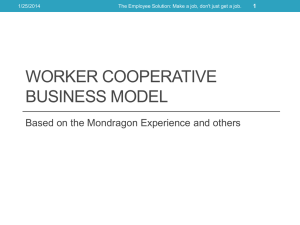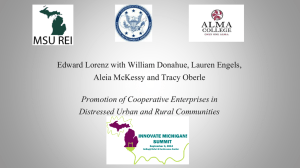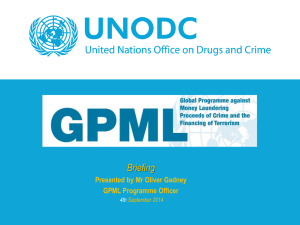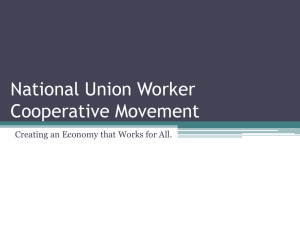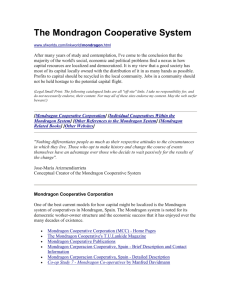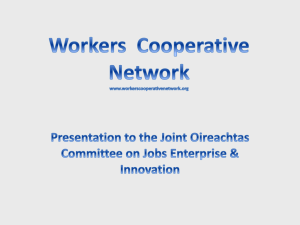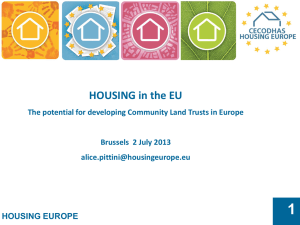Crisis management: the case of MONDRAGON Corporation
advertisement
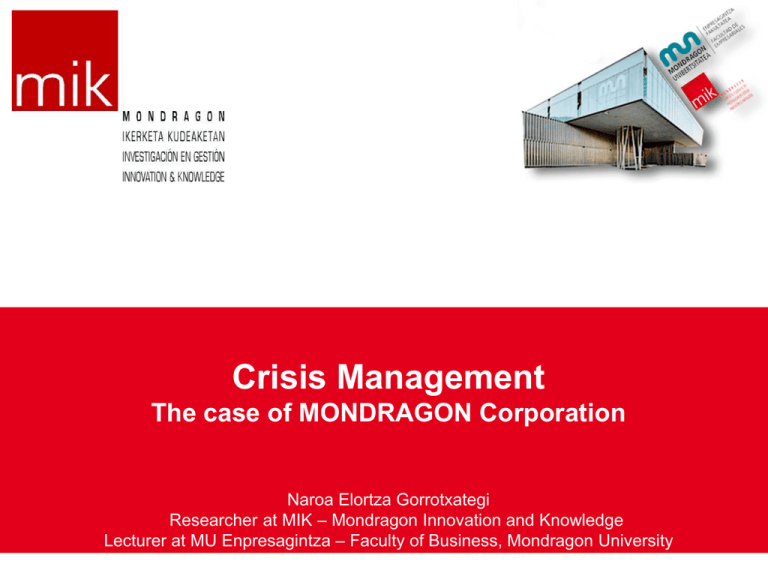
Crisis Management The case of MONDRAGON Corporation Naroa Elortza Gorrotxategi Researcher at MIK – Mondragon Innovation and Knowledge Lecturer at MU Enpresagintza – Faculty of Business, Mondragon University 1 The Mondragon Cooperative Experience 2 Crisis management in MONDRAGON 3 Application of the management tools and the results 4 Conclusions 2 1 The Mondragon Cooperative Experience Beginnings MONDRAGON today MONDRAGON as a reference and a successful experience 2 Crisis management in MONDRAGON 3 Application of the management tools and the results 4 Conclusions 3 Beginnings The Mondragon Cooperative Experience (MCE) started in 1943, in Mondragon (Basque Country) The cooperative alternative was based on: Education and Training, Cooperation, Responsibility and Egalitarian Enterprise Development 4 The network Its key INNOVATION was THE NETWORK... two elements: Support institutions in common, jointly created and controlled. Social security and insurance Technology R&D Lagun-Aro Ikerlan (etc.) Finance Caja Laboral Popular Firm-to-Firm Collaboration, mutual support and joint action. Take advantage of new business opportunities AND help each other out in hard times. Organised into Areas and Divisions,and coordinated by Central Services (the Corporation) 5 MONDRAGON today Formed by 258 cooperative enterprises, subsidiaries and affiliated organisations Total jobs: 83,859 (2010) Total sales: 13,989 million euros (2010) International sales: 3,594 million euros (2010), 63% of industrial sales Divided into 4 Groups: Finance, Industry, Retail and Knowledge Within the Industrial Group, 12 Divisions Its own set 10 basic principles based on its experience and on ICA's principles 6 MONDRAGON as a reference and successful experience MONDRAGON's mission is expressed in its corporate values: cooperation, empowerment, innovation and social responsibility It is considered one the most successful experience if not the most successful example of worker cooperatives MONDRAGON's economic and social achievements: ENTERPRISE with social commitment, broad worker ownership and control; and solidarity among cooperatives Supported by several external authors; benefits derive from the business model based on networked cooperative enterprise. 7 MONDRAGON as a reference and successful experience Blemishes, challenges and problems. PLENTY (especially overseas plants), but save the discussion for another day. Here, our focus: Crisis management policy and tools in MONDRAGON How MONDRAGON's business model and its management tools make a difference in severe economic and social crisis. 8 1 The Mondragon Cooperative Experience 2 Crisis management in MONDRAGON Impact of the crisis on MONDRAGON MONDRAGON's crisis management tools Firm-level measures Network-level measures 3 Application of the management tools and the results 4 Conclusions 9 18000 900 16000 800 14000 700 12000 600 10000 500 8000 400 6000 300 4000 200 2000 100 0 2005 2006 2007 2008 2009 Million euros (consolidated results) Million euros (sales) Impact of the crisis on MONDRAGON Sales in MONDRAGON Sales in the Industrial Area Consolidated Results 0 2010 10 Impact of the crisis on MONDRAGON As a result, a significant decline in overall investment and in resources spent on social activities, non-profits 3000 45 40 2500 2000 30 25 1500 20 1000 15 Million euros (social activities) Million euros (overall investments) 35 10 500 5 0 0 Overall investments Resources assigned to social activities 11 MONDRAGON's crisis management tools Crisis management tools based on the solidarity and mutual assistance (“Intercooperation”) among cooperatives: MCE's 7th principle Takes concrete shape in the 2 network elements we described (1) joint institutions, (2) firm-to-firm cooperation AND in specific policies and tools. Precedents: the Energy Crisis of the 1970s-80s 12 MONDRAGON's crisis management tools Main objective: reduce the crisis' effects on the cooperatives and the society Key elements: Members' participation in crisis decision-making processes Cooperatives balance: economic (profitability, productivity...) and social objectives (employment creation and protection, human and social development) 13 Firm-level measures Principal measures: Cutting pay and interest payments; a General Assembly decision Interest on internal capital account Profit share ORDER OF Salary APPLICATION? Vacation bonuses (2-3 pay periods of 14-15) Internal transfer Re-training Redundancy of temporary and subcontracted employees (nonmember) 14 Network-level measures Division-level profit pooling Network-level funds Central Inter-cooperation Fund Venture capital and other investments Education and Cooperative Promotion Fund Cooperative and professional training for members Research and technological development Corporate Solidarity Fund Loss reduction 15 Network-level measures Lagun-Aro, EPSV • (Re)Employment Assistance Fund; finances activities to keep members employed during downturns. • Relocation among cooperatives; temporary and permanent relocations • Re-training • Flexible calendar • Early retirements • Compensation (when other measures are insufficient) 16 MONDRAGON's crisis management tools Caja Laboral Popular First phase... 1959-1990, financed cooperative development with local consumers/depositors' savings and cooperatives deposits Today cooperative bank business focused on retail banking: consumers, SMEs, co-ops to small degree (Bank of Spain) Can write off cooperatives' unpaid debt, though uncommon Consultancy: First phase: “Business Division” inside the bank to assist startups and co-ops with problems. Later, converted into Central Departments and LKS Consultancy cooperative 17 1 The Mondragon Cooperative Experience 2 Crisis management in MONDRAGON 3 Application of the management tools and the results 4 Employment Assistance Fund and Benefits Flexible Calendar Relocations Relocations and Flexible Calendar Employment Conclusions 18 Employment Assistance Fund & Benefits A significant raise in resources devoted to employment protection 80000 70000 60000 Euros 50000 40000 30000 20000 10000 0 2005 2006 2007 Fund 2008 Collection 2009 2010 Benefit 19 Flexible Calendar A significant increase in co-op workers' hours financed by the Employment Fund, during the crisis 60000 50000 40000 30000 Flexible Calendar Hours / Month 20000 10000 11/10 09/10 07/10 05/10 03/10 01/10 11/09 09/09 07/09 05/09 03/09 01/09 11/08 09/08 07/08 05/08 03/08 01/08 0 20 Relocations A considerable raise in worker-member relocations during the crisis 600 40 35 500 25 300 20 15 200 10 100 5 10/12 10/10 10/05 07/10–08/10 Temporary Relocations Permanent Relocations 10/03 10/01 09/11 09/09 09/06 09/04 09/02 08/12 08/10 08/07–08/08 08/05 0 08/03 0 Permanent Relocations 400 08/01 Temporary Relocations 30 21 21 Relocations and flexible calendar 600 50000 500 40000 400 30000 300 20000 200 10000 100 0 Temporary Relocations Permanent Relocations Flexible Calendar Hours 07/10–08/10 0 Permanent Relocations 60000 07/08–08/08 Temporary Relocations Comparing relocations and flexible calendar data... 22 Employment Still, a significant decline in employment in 2009; temporary workers made redundant. Controversy/debate about temporary workers. Law: 70%, MONDRAGON 85%, but still debate. 100000 90000 80000 Employees 70000 60000 Total Basque Autonomous Community Navarre 50000 40000 30000 20000 10000 0 2005 2006 2007 2008 2009 2010 23 Employment Decline in MONDRAGON’s domestic employment, increase MONDRAGON’s overseas employment. %60,00 %50,00 %40,00 * Basque Country The rest of the world %30,00 %20,00 %10,00 %0,00 2005 * 2006 2007 2008 2009 Basque Autonomous Community and Navarre 2010 24 1 The Mondragon Cooperative Experience 2 Crisis management in MONDRAGON 3 Application of the management tools and the results 4 Conclusions Crisis management and cooperative principles Employment in MONDRAGON MONDRAGON’s crisis management’s incoherence with cooperative principles 25 Crisis management and cooperative principles o Crisis management based on solidarity, consistent with the MONDRAGON’s 7th cooperative principle o Decision-making processes based on members' participation. Participatory model might weaken short-term business efficiency, but fosters members' sense of belonging and motivation and long-term efficiency. o Worker-members' relocation and pooling of profits are signs of cooperatives’ commitment to solidarity. THOUGH… o Solidarity is far from perfect. Temporary workers, overseas non-member workers, etc. 2626 Employment in MONDRAGON o The tools were designed to reduce the negative effects of the crisis on the co-ops and society broadly o Their main purpose has been to protect jobs o During previous crisis periods, MONDRAGON managed to mantain and even expand employment o The cooperatives made massive efforts to protect worker-members' jobs during those periods o Lagun-Aro's Employment Assistance Fund has been a key tool 27 Crisis mangement’s incoherences with Co-op Principles o The vast majority of worker-members' jobs have been mantained, but most temporary workers have been made redundant (up to 15% of employment in some cooperatives) o Proportionally, the number of jobs destroyed in the Basque Country (Basque Autonomous Community and Navarre) in MONDRAGON is higher than in other countries o The ORDER in which measures are implemented is crucial to determining consistency with cooperative principles. Mainly regarding temporary workers jobs. 28 Thank you Gracias Eskerrik asko Naroa Elortza Gorrotxategi nelortza@mondragon.edu Blog: Twitter / Identi.ca: LinkedIn: www.mik.es http://ilunkaran.com @naroaelortza http://www.linkedin.com/in/naroaelortza
